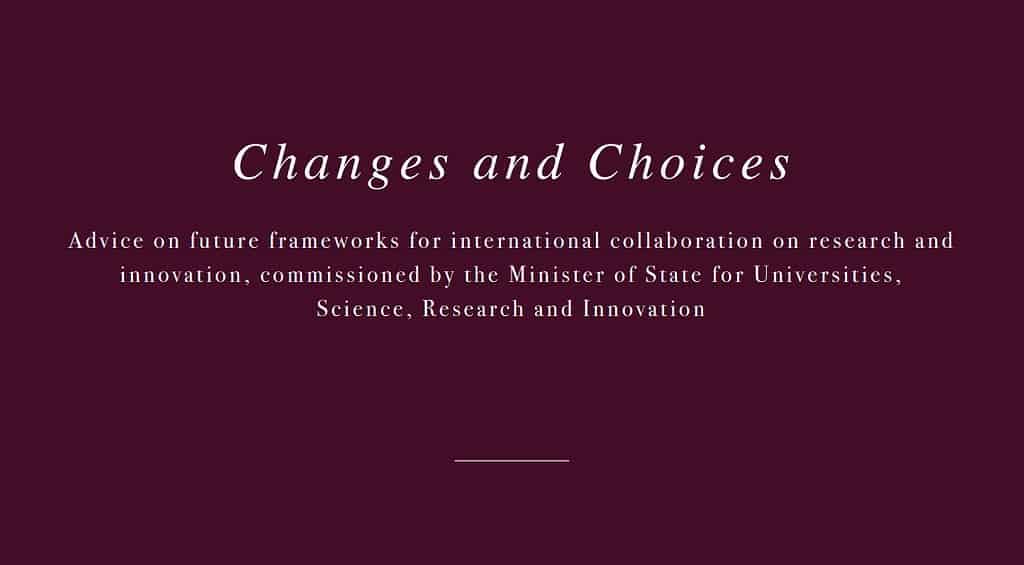Professor David Cole-Hamilton and William Hardie of the Royal Society of Edinburgh, on the importance of maintaining a collaborative environment for research and innovation.
The implications of Brexit for research and innovation
18 Aug 2017
We are pleased to have the opportunity to update CaSE members on the work the Royal Society of Edinburgh (RSE) has been undertaking on Brexit. In light of the UK triggering article 50 that signalled the start of the Brexit negotiations, the RSE established an EU Strategy Group, led by RSE Fellow Sir John Elvidge, former Permanent Secretary to the Scottish Government. The strategy group has overseen the preparation of four initial position papers on the implications of Britain leaving the EU. This reflects the importance of ensuring that negotiators are fully aware of the possible effects of Brexit on the UK and on Scotland as a distinctive part of the UK.
Drawing upon the multidisciplinary breath of expertise within the RSE Fellowship and the Young Academy of Scotland, the papers, published in July, cover the following key areas of policy: Migration and Diversity; Research, Innovation and Tertiary Education; Economy, Public Finance and Economic Strategy; and Constitutional Law and Government. The papers, which are available from the RSE website, have been widely disseminated to key ministers and officials leading on Brexit negotiations at UK, Scottish and EU levels, as well as to Parliamentarians and policy influencers. This article focuses on the position paper developed by the Research, Innovation and Tertiary Education working group.
To maintain its international research and innovation competitiveness, it will be crucial to ensure that the UK continues to be seen as being ‘open for business’. As a first order priority the UK Government needs to provide assurance that the existing rights of EU nationals in the UK will be protected, while seeking reciprocal protections for the rights of UK nationals working and studying within the EU. Notwithstanding government commitments and recent developments in this area, the post-Brexit status of EU citizens living in the UK and UK nationals living in the EU remains uncertain.
The provision of a long-term, transparent and consistent research funding landscape has undoubtedly contributed to the success of both the UK and EU research effort. In 2014-15, more than 14% of UK universities’ research income came from EU sources. The UK has been especially successful in securing 15.4% of the available funding from Horizon 2020 (H2020) (second only to Germany), with Scotland receiving more per head of population than any other UK region. The UK’s continued participation in H2020 must be a priority objective for the negotiations.
Funding is however only part of the picture. Indeed, even if there were no funding detriment for UK research and innovation resulting from the UK’s departure from the EU, this would not compensate for the potential reduction in collaborative activity should the UK be unable to retain full access to EU research programmes. The reputation of our universities and research institutes is heavily dependent on their ability to recruit and retain the highest quality staff and students from the EU and internationally. EU nationals comprise 17% of the UK’s academic workforce and 23% of Scotland’s research-only staff. Let us not forget the vital contribution made to UK research endeavour by EU and international technical and support staff. 22% of the student population in Scotland comprises non-UK EU nationals and international citizens. Exchange programmes, including Erasmus +, have enabled UK staff and students to gain valuable experience of studying and working abroad. The RSE supports the reintroduction of the post-study work visa in Scotland, especially as the freedom of movement of EU citizens remains uncertain.
H2020 supports long term curiosity driven research through the European Research Council (ERC). Intense competition has helped drive up research standards, and recipients of ERC grants enjoy special prestige. Collaborative research projects involving 20+ academic and industrial groups drawn from several different countries tackling major societal problems such as climate change, cancer and antimicrobial resistance take novel and exciting findings to the industrial demonstration stage. With its focus on scaling-up innovation performance, the emerging European Innovation Council is a particularly important development which we hope the UK can tap into, particularly given the emphasis on innovation in the UK Government’s Industrial Strategy.
The UK needs to retain overall equivalence with the EU regulatory system to maximise the potential for the UK’s continued access to EU markets post-Brexit. There could be opportunities for the UK to modify some of the standards and guidelines to make them more proportionate to the risks and benefits of innovation, while still ensuring adequate protection of health, well-being, species diversity and the environment. The success of UK and EU level initiatives to support innovation will depend on our ability to develop more proportionate and adaptive regulatory systems in future.
It is crucial that the UK, including Scotland, achieves the closest possible association with the EU research system. We believe that the research and innovation communities both in the UK and in the EU would be best served by the UK negotiating to remain fully within Horizon 2020 and its successor Framework Programmes and to be involved in forward planning of these programmes.
Professor David Cole-Hamilton, Chair of the Royal Society of Edinburgh EU working group on Research, Innovation and Tertiary Education; and William Hardie, Policy Advice Manager at the Royal Society of Edinburgh.
Related articles

The Physiological Society’s policy team on the health challenges facing older workers and the urgent need to develop a strategy to ensure older people are happy and healthy at work.

Jo Reynolds, Director of Science and Communities at the Royal Society of Chemistry, on the RSC’s new summary report looking to unlock the potential of deep tech SMEs.

Lisa Morrison Coulthard, Research Director at the National Foundation for Education Research, on the Nuffield Foundation funded five year research programme providing insights into the essential employment skills needed for the future workforce

Sir Adrian Smith, Institute Director and Chief Executive of The Alan Turing Institute, and Graeme Reid, Professor of Science and Research Policy at UCL, set out the findings from their new independent report on international partnership opportunities for UK research and innovation